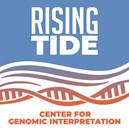
Julie Eggington, MS, PhD, “Completing a ‘variant classification’ assessment is extremely important to help determine whether a variant is pathogenic or likely pathogenic, with both being positive results, benign or likely benign, being negative results, or whether the findings are inconclusive.”
ANNAPOLIS, Md. (PRWEB)
August 26, 2021
The Center for Genomic Interpretation (CGI) continues hosting its cutting-edge Rising Tide Podcast series, which features nationally-recognized experts in precision medicine. In Episode 3, the CGI Podcast features an interview with Dr. Madhuri Hegde, PhD., VP and Chief Scientific Officer of Global Laboratory Services at Perkin-Elmer.
This session, entitled “Variant Classification in Clinical Genetics & Genomics: Opportunities & Obstacles,” focuses on the importance of variant classification and the use of guidelines to help interpret precision medicine results. Dr. Hegde is a recognized expert in this field in part because of her clinical work in the development and implementation of high throughput next generation sequencing (NGS) strategies for genetic/genomic disorders. She is also a co-author of the 2015 guidelines published by the American College of Medical Genetics and Genomics on germline variant classification.
“In most cases, when a genetic or genomic test is ordered to help determine if a patient has one or more disease-causing mutations, many different genetic variations are discovered” notes Julie Eggington, MS, PhD, CGI’s CEO and co-founder. “Completing a ‘variant classification’ assessment is extremely important to help determine whether a variant is pathogenic or likely pathogenic, with both being positive results, benign or likely benign, being negative results, or whether the findings are inconclusive.”
As highlighted in the podcast, the process of classifying variants can be complex, intense, and difficult. Some have described it as the ‘Achilles heel’ of clinical genetics and genomics. Podcast listeners will gain new perspectives in understanding this dynamic landscape.
During her discussion, Dr. Hegde stresses three take home messages:
- “The first one is that variant classification does require human intervention, and it is not something you can rely on just looking at databases. When you get a clinical report, talk to the laboratory, ask questions. What testing was done? What are the missing holes? Are there proper disclaimers or not? Absolutely critical when taking a clinical report and applying it to patient care.”
- “The number two thing is that the research aspect side of variant classification is [important], [it helps to] actively contribute back to the community as well, by working or collaborating with the lab so that they can accumulate the data and publish it. It is difficult for clinical labs to get IRB consents or go and approach the patient. The physician and the genetic counselors are that link in between, and this is really important.”
- “And the third thing is giving the outcome information is also very, very important, so that we can fine-tune this art and science of variant classification and move forward with bringing in new technologies for clinical care.”
Don’t forget to tune in to this and future CGI Rising Tide Podcasts episodes. The complimentary podcasts are hosted through YouTube and can be viewed here, or can be listened to on your favorite podcast outlet, found here.
For more information about CGI, see https://www.genomicinterpretation.org. CGI is offering several unique ELEVATEGENETICS programs that establish meaningful and actionable pathways to improve genetic/genomic testing, analysis and reporting. For payers, ELEVATEGENETICS metrics offer unique evaluations when selecting and contracting with laboratories. For laboratories, these programs offer a unique third-party review focusing on key aspects of the genetic/genomic testing process which can dramatically improve the accuracy of test findings. For providers and consumers, CGI offers a number of resources to better understand the complex landscape of precision medicine.
The Center for Genomic Interpretation – http://www.genomicinterpretation.org
The Center for Genomic Interpretation (CGI) is an independent 501(c)(3) nonprofit organization with the mission to save and improve lives through encouraging careful stewardship of clinical genetics, genomics and precision medicine. Too frequently the precision medicine goals of patients and their providers are unknowingly thwarted by inaccurate or ineffective genetic or genomic testing. We facilitate the realization of value from among the confusing scramble of the new precision medicine era. The CGI team consists of clinical genetics and genomics scientific leaders, healthcare policy veterans, experienced business professionals, and others dedicated to helping stakeholders achieve the vision and promise of precision medicine. CGI offers a range of programs and services targeted to all stakeholders including patients, providers, payers, pharmaceutical developers, policy makers and laboratories.
Share article on social media or email:

